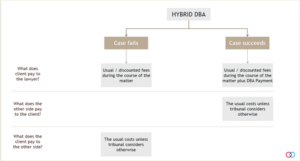Hourly fees for lawyers are the norm in Hong Kong. Regardless of the outcome of the case, clients usually pay for the time that lawyers spend working on their matters. On 30 June 2022, the government gazetted the Arbitration and Legal Practitioners Legislation (Outcome Related Fee Structures for Arbitration) (Amendment Ordinance) 2022 (“Amendment Ordinance”). The effect of the Amendment Ordinance is to allow lawyers to charge success fees in arbitration and related court and mediation proceedings. Success fees were otherwise prohibited by the common law doctrines of maintenance and champerty.
With the permissibility of ORFS, parties have more flexibility to tailor a fee mechanism that works for their arbitrations – the amount a party pays their lawyer depends on whether they win and how much they win.
It is important to note that despite the Amendment Ordinance coming into effect on 30 June, the material parts of the Amendment Ordinance (i.e. the sections relating to the exemption of ORFS to the common law offences and endorsement of ORFS agreement as valid or enforceable) are not yet in effect. They will only come into operation on a day to be appointed by the Secretary for Justice by notice. As at the date of writing, that has not yet happened.
What billing structures are introduced by the Amendment Ordinance?
In gist, three types billing structures are introduced:
Conditional Fee Agreements (“CFA”), aka “No Win, No Fee”, or “No Win, Low Fee”
If the case fails, the client pays nothing (no win, no fee) or only the usual or discounted fees (no win, low fee), during the course of the matter.
If the case succeeds, the client pays for the legal services rendered plus an agreed uplift (“Success Fee”).

Damages-based Agreements (“DBA”)
If the case fails, the client pays nothing (no win, no fee).
However, if the case succeeds, the client pays an agreed proportion of the financial benefit awarded to / recovered by the client (“DBA Payment”).

Hybrid DBA
If the case fails, the client pays only the usual / discounted fees during the course of the matter (no win, low fee).
If the case succeeds, the client pays for the legal services rendered plus a DBA Payment.

The need for ORFS in Hong Kong
Under current Hong Kong laws, legal practitioners are generally prohibited from charging legal fees based on outcome of litigation or arbitration. This is in contrast to other jurisdictions where some form of ORFS legislation or proposals are already in place.
Noticeably, ORFS are well-known and well-practiced in China Mainland. With the recent developments between China Mainland and Hong Kong benefiting the arbitration practice in both jurisdictions, for example, the Belt and Road Initiative, a ground-breaking Interim Measures Arrangement (in respect of which, see our post here) and the recent signing of a Supplemental Arrangement for Mutual Enforcement of Arbitral Awards between the Mainland and HKSAR (see our post on that arrangement here), it is anticipated that arbitrations in Hong Kong relating to China Mainland disputes will only increase. Under ORFS, prospective China Mainland clients can enjoy more flexible and familiar fee structures when engaging Hong Kong lawyers.
The Amendment Ordinance provides various alternatives for clients who wish to limit or eliminate the legal costs burden involved in pursuing proceedings, giving themselves more cash flow and financial flexibility while arbitrating in Hong Kong. The Amendment Ordinance also responds to the desire of clients increasingly wanting their lawyers to have a share of the risk in arbitration.
Conclusion
ORFS is exciting for both clients and lawyers. We are closely monitoring updates to the Amendment Ordinance and the date on which the material provisions come into effect. In the meantime, before ORFS are up and running, clients would be well advised to familiarize themselves with the ORFS regime. Useful questions for in-house counsel to ask are:
- What is their organisations risk-sharing style and appetite;
- What arrangements are their lawyers willing to provide to suit their needs;
- How a matter’s progress would impact ORFS agreements, and what provisions an organisation needs to put in place to cater for contingencies.








